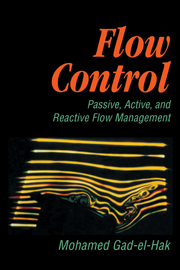Book contents
- Frontmatter
- Contents
- Preface
- Nomenclature
- 1 Introduction
- 2 Governing Equations
- 3 Unifying Principles
- 4 Coherent Structures
- 5 Reynolds Number Effects
- 6 Transition Control
- 7 Compliant Coatings
- 8 Separation Control
- 9 Low-Reynolds-Number Aerodynamics
- 10 Drag Reduction
- 11 Mixing Enhancement
- 12 Noise Reduction
- 13 Microelectromechanical Systems
- 14 Frontiers of Flow Control
- Epilogue
- Bibliography
- Index
Epilogue
Published online by Cambridge University Press: 23 December 2009
- Frontmatter
- Contents
- Preface
- Nomenclature
- 1 Introduction
- 2 Governing Equations
- 3 Unifying Principles
- 4 Coherent Structures
- 5 Reynolds Number Effects
- 6 Transition Control
- 7 Compliant Coatings
- 8 Separation Control
- 9 Low-Reynolds-Number Aerodynamics
- 10 Drag Reduction
- 11 Mixing Enhancement
- 12 Noise Reduction
- 13 Microelectromechanical Systems
- 14 Frontiers of Flow Control
- Epilogue
- Bibliography
- Index
Summary
To be conscious that we are perceiving or thinking is to be conscious of our own existence.
(Aristotle, 384–322 B.C.)Minds are like parachutes. They only function when they are open.
(Sir James Dewar, 1842–1923)The field of flow control is broad, practically very important, and rich in scientific and technological challenges. Though the field is as old as man himself, its potential for improving our lives will keep it going strong for yet another millennium. In this book, I have made a modest attempt to place the field in a unifying framework and to categorize the different control strategies properly. At a minimum, I hope to have provided a useful navigation tool through the colossal literature in the field of flow control and its intricately related subfields such as control theory, chaos, microelectromechanical systems, soft computing, and so forth. Review articles were favored for citation because they themselves usually contain many useful citations.
As is clear from all the previous chapters, there is no lack of flow-control methods to achieve a particular goal for free-shear as well as wall-bounded flows across the entire range of Mach and Reynolds numbers. Ranging from simple to complex, from inexpensive to expensive, from passive to active to reactive, and from market-ready to futuristic, a great variety of control devices are at the disposal of the fluids engineer. Flow control is most effective when applied near the transition or separation points; in other words, near the critical-flow regimes where flow instabilities magnify quickly.
- Type
- Chapter
- Information
- Flow ControlPassive, Active, and Reactive Flow Management, pp. 359 - 362Publisher: Cambridge University PressPrint publication year: 2000



